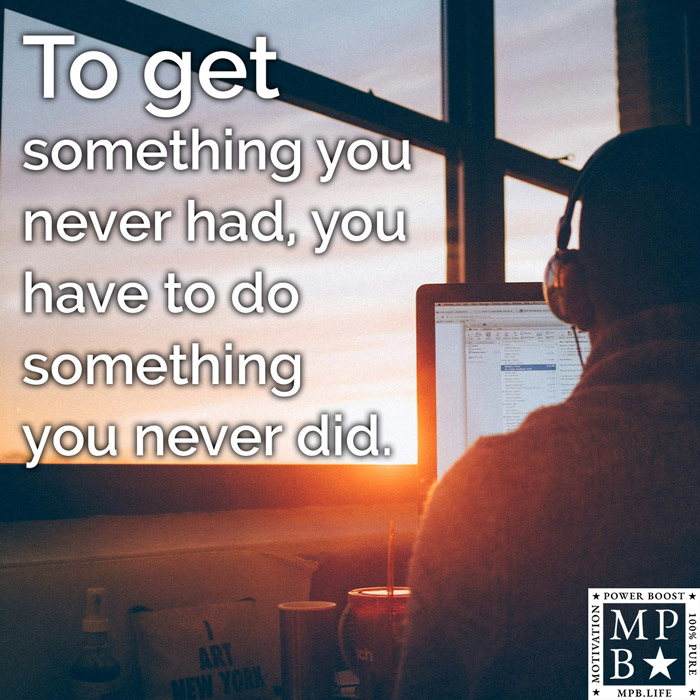
To Get Something You Never Had, You Have To Graphic © motivationpowerboost.com
To get something you never had,
you have to do something you never did.
Entering the Unknown: The Key to Unlocking Your Potential
Throughout our lives, we often find ourselves yearning for things we have never possessed. Whether it’s a dream job, a fulfilling relationship, or a sense of inner peace, these aspirations can seem distant and unattainable. However, the truth is that the path to achieving these desires lies in venturing beyond our comfort zones and embracing the unfamiliar. As the saying goes, “To get something you never had, you have to do something you never did.”
Fear of the unknown is a natural human instinct, but it is also the greatest obstacle standing between us and our goals. We tend to cling to the familiar, even if it doesn’t serve our best interests, because it provides a sense of security. But growth and progress require us to step outside of our self-imposed boundaries and explore uncharted territory.
Consider the countless success stories of individuals who dared to break free from the status quo. They didn’t achieve greatness by following the well-trodden path; instead, they forged their own way, often facing adversity and setbacks along the journey. Their willingness to embrace the unknown and take calculated risks set them apart from the crowd and allowed them to manifest their dreams.
So, how can we cultivate the courage to do something we’ve never done before? The first step is to reframe our mindset. Instead of viewing the unknown as a threat, we must see it as an opportunity for growth and self-discovery. Embrace the discomfort that comes with trying something new, knowing that it is a sign of progress and personal expansion.
Next, set achievable goals and break them down into manageable steps. Rather than overwhelming yourself with a daunting task, focus on taking small, consistent actions that move you closer to your desired outcome. Celebrate each milestone along the way, no matter how small, as it serves as a reminder of your progress and fuels your motivation to continue.
Surround yourself with supportive individuals who encourage you to step outside of your comfort zone. Seek out mentors, join communities of like-minded individuals, and engage in activities that challenge you to grow. Remember, growth often happens in the company of others who are also committed to personal development.
Finally, cultivate a sense of curiosity and embrace the joy of learning. Approach new experiences with an open mind, eager to absorb the lessons and insights they have to offer. Recognize that failure is an inevitable part of the process, but it is not a reflection of your worth. Instead, view setbacks as valuable feedback that can guide you toward success.
In the pursuit of our dreams, we must be willing to venture into uncharted territory. By embracing the unknown and doing things we’ve never done before, we open ourselves up to a world of limitless possibilities. So, take that first step, no matter how small or daunting it may seem. Trust in your resilience, your ability to adapt, and your capacity for growth. Remember, the greatest rewards often lie just beyond the boundaries of our comfort zones.
Overcoming the Stumbling Blocks: Practical Strategies for Navigating the Unknown
While the benefits of embracing the unknown are clear, putting this principle into practice can be challenging. We often encounter internal and external obstacles that hinder our progress. However, by developing a practical and proactive approach, we can overcome these hurdles and stay on track towards our goals.
One common stumbling block is self-doubt. When faced with unfamiliar situations, our inner critic can become loud and persistent, planting seeds of doubt and undermining our confidence. To combat this, it is crucial to cultivate self-awareness and challenge negative self-talk. Remind yourself of your past successes, no matter how small, and use them as evidence of your resilience and ability to adapt.
Another obstacle is the fear of failure. Many people avoid taking risks or trying new things because they are afraid of the potential consequences of failure. However, it is important to reframe our perspective on failure. Instead of viewing it as a permanent setback, consider it a valuable learning experience. Analyze what went wrong, identify areas for improvement, and use that knowledge to refine your approach moving forward.
External factors, such as societal pressures or the opinions of others, can also impede our willingness to explore the unknown. It is essential to develop a strong sense of self-belief and the courage to chart your own course. Surround yourself with supportive individuals who encourage your growth, and distance yourself from those who seek to impose limitations or undermine your aspirations.
Practical strategies can also help us navigate the unknown more effectively. One powerful technique is to break down larger goals into smaller, actionable steps. This not only makes the task feel more manageable but also allows you to celebrate incremental victories along the way, fueling your motivation and confidence.
Additionally, seeking out mentors or role models who have successfully navigated similar challenges can provide invaluable guidance and inspiration. Their experiences and insights can offer a roadmap for overcoming obstacles and staying focused on your objectives.
Ultimately, embracing the unknown requires a combination of mindset shifts, practical strategies, and unwavering determination. By addressing internal and external obstacles head-on, cultivating a growth mindset, and developing a proactive approach, we can unlock our full potential and achieve remarkable personal and professional growth.
Related Inspirational Quotes
“An over-cautious person does not achieve great things.” – Tatsuko Shibata
“Do not be afraid of going slowly, be afraid only of standing still.” – Chinese Proverb
“All things are difficult before they are easy.” – Thomas Fuller
“They must often change, who would be constant in happiness or wisdom.” – Confucius
“The pessimist complains about the wind; the optimist expects it to change; the leader adjusts the sails.” – John Maxwell
